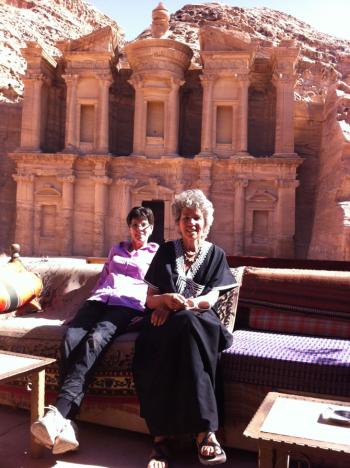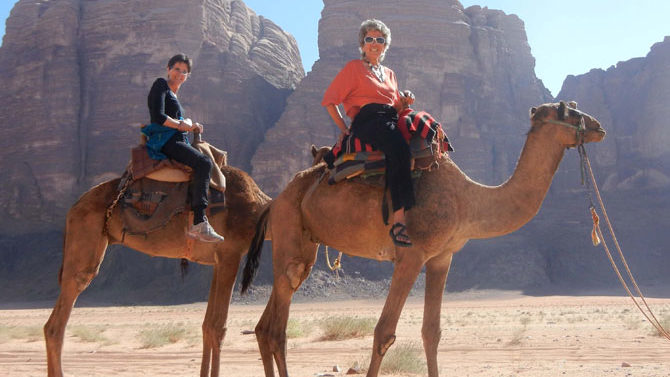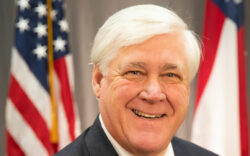[Editor’s Note] Former Athens mayor and activist-about-town Gwen O’Looney recently returned from a trip to Europe and the Middle East and shares some of her impressions with Flagpole publisher Pete McCommons.
Flagpole: So, you and John swapped domiciles with a couple from The Hague in the Netherlands?
Gwen O’Looney: Yes, It’s not far from Amsterdam. Less than 50 miles. It’s their international city: all the embassies and national government buildings.
FP: Like Washington?
GO: It’s not the capital. Amsterdam is the capital.
FP: And you rode bicycles everywhere?
GO: Everywhere. I was totally amazed at the age range, and the level of competency was high. In the mornings we had this great window seat, and I would sit and watch all the people going to work on their bikes. And then you see the very youngest with their little bikes; they become competent over the years.
FP: They have separate bike lanes?
GO: Their whole transportation system is pedestrian first, bike second and last is the car. And add a layer of consciousness, awareness, that we’re not used to.
FP: Plus, no hills.
GO: No hills, and so it’s different. It’s amazing how fast you can get places. Pedaling there is like walking, gliding. Even so, I felt a little awkward and worried. I never completely relaxed.
FP: But you just started riding a bike.
GO: Even John was impressed that at intersections there were three lights: for cars, pedestrians and bikes. On the second day on my bike I broke my middle toe on my right foot. It never interfered with walking. Can’t do anything about a middle toe.
FP: You were there two weeks, then John came back. Where did you go?
GO: I left The Hague and went to Paris, then to Barcelona, by bus. A Euroline bus pass for a month for 350 Euros.
FP: That’s the equivalent of about $475?
GO: That’s right. I rode the bus everywhere. It was a conscious choice. I could have taken the train, but the train didn’t go to some of the small cities, and the bus is more intimate. People tell you things. Bus riders become a family. I wanted to travel with the people, be integrated with the culture. The train, in certain ways, is like riding by an aquarium, looking in but not a part. I designed the trip so so that I was integrated with people and their cultures.
Then I had to fly from Barcelona to Marakesh and back. I went from Barcelona to to Nice, France on the bus, then from Nice to Prague on the bus.
FP: Good Lord!
GO: Then from Prague to Bratislava, the Slovakian capital. I had never gone to the Eastern capitals. Same with Krakow. It was too far and too cold. I went to Bucharest then flew to Jordan, and I traveled there two weeks. Then went from Jordan by bus to Israel. Flew out of Ben Gurion by way of Istanbul and home.
FP: Two months in all?
GO: Yes.
FP: And from The Hague, John came back here and you went to Paris?
GO: I wasn’t in Paris very long. I found a hotel that would take my luggage. I stayed on the Champs Élysées. I decided not to rent a room. I rode buses during the night. Had a wonderful time. Walked around the Eiffel Towel and watched the sun come up. People setting up flowers in the markets. Great window shopping on the Champs Élysées.
FP: From Paris you went to Barcelona, and your suitcase was stolen?
GO: Probably at the north bus station in Barcelona. Somebody just took it off. Just like today in the airport, you can walk off with anybody’s suitcase.
FP: What did you do?
GO: Got there about 5:45 a.m. Got off the bus. Found out I didn’t have a suitcase.
Traveling light. Wouldn’t have to worry about dropping off a suitcase. Might as well go see the Gaudi. Went over to a coffee shop, and I said I wanted to go to Sagrada Familia. She said, “Oh, hurry and you will get in.” I was third in line. It opened at eight and the line was four hours long by 11 o’clock. I had seen pictures of the outside. They’re still working on it, and they’re determined to finish by 2030. That kind of commitment is interesting. Intricate things in his work, especially in the house that he built for someone who commissioned it and gave him freedom. It has all these light wells. It’s lit by the sun.
For some reason Barcelona attracted a proliferation of architecture since the turn of the century. It’s literally at almost intersection you stop. All streets, the main thoroughfares have down the middle a promenade. A walkway with trees and cycling paths divides the street. Barcelona leaves spaces: very sophisticated. It’s a major fashion center of Europe, though of course I only had on what I had on the bus. I was wearing two layers because of the cold. At the central market I bought linen pants for a dollar and then another top for a dollar.
FP: So, Barcelona turned out okay in spite of losing your suitcase.
GO: The trip was just rich with experiences. In Barcelona, I stayed in a mixed dorm room with boys and girls from Spain, Germany and Slovakia. I was the first one out in morning and the last one in at night. They would go out at, like, 11:30 to clubs and come in at, like, six in the morning. And these clubs cost, like, $25 to get in. Expensive. And then they would change and another group would come in. It was so enlightening. No matter what nationality was in the room, they would use English. I was like a fly on the wall, learning. They were serious about their studies and worried about getting a job. The whole world is worried about getting a job.
FP: How did you find that America is perceived?
GO: When I traveled in 1970, perceptions of America were very negative, because of the Vietnam War. Now, America is very loved. There’s a huge amount of advertising in English no matter where you are. English is the language of science now. All the music you hear in stores is English. With our words. When I traveled in 2000, 2002 I felt like you could hear the culture of the other countries. Now, our culture is more prevalent than I ever remember it, though I didn’t see Europe back then.
FP: Why did you go from Barcelona to Morocco?
GO: When I was traveling in 1970, I wanted to go to Morocco. Got over on a ferry. They asked you then how many days you were going to stay and how much money you had with you. There were no ATMs or international banks. You either had American Express or carried money with you. They asked me to step over and wait, and then they said I didn’t have enough money to come in, and they sent me back.
FP: How much did you have?
GO: I think I had $30. Morocco was filled with filthy hippies. That was the era. They didn’t want any more.
FP: So, you had always wanted to go to Morocco.
GO: Barcelona, Morocco, Tunisa, Egypt, Jordan. I couldn’t go to Egypt or Tunisia because of the trouble there, so I hopped over and back, roundtrip from Barcelona.
FP: And then you went to Nice?
GO: From Barcelona, I went to Nice on the bus, to visit Athenians Sue Custance and Clint McCrory. His math partner is there. It took a good while. I left Barcelona at like 3 p.m. and got there around noon. Most of these cheap trips are at night. I missed more than I wanted to miss. I would have sat wide-eyed at the window all the way.
At Marseille, everybody got off. When we started up again, it was just the bus driver and me and this beautiful Spanish woman, a student in the Institute of Technology at Nice, and this old man who was the luggage assistant. Sue had told me that the bus station was way out past airport.
The older man could not speak any English. The bus driver asks me where I’m going. He tells the older man, who picks up a PC, calls up GPS and shows me exactly where we are and where the bus station is. We keep going, looking at the Riviera. He turns on dance music. He drops me one block from Sue and Clint.
FP: And then you got right back on the bus and went all the way to Prague?
GO: Prague is unbelievably beautiful, and all the streets are paved with stones. Sunburst designs, and such. Anyway, I wanted to go to the neighborhoods where the residents shop. I went way out, to an old church with a cemetery where Antonín DvoÅ™ák is buried. Then I went to a shopping mall. They had three rows of these three-sided, beautiful wooden tables filled with pastry, bread, food. And I just thought, we are poor. It was just a local supermarket. Not fancy.
I asked a man shopping if I could take his picture. He wanted to know why. He could not believe America does not have this: more than 30 kinds of bread, pastries, cheeses. Rich.
FP: Did you stay in a youth hostel in Prague, too?
GO: I stayed in youth hostels everywhere. It was great. Anyway, all my hostels were the cheapest places in best locations; I could not believe it. Fancy hotels are out of the old city. Youth hostels are right in the center: small, mostly family-owned.
FP: How much did they cost in the equivalent of dollars?
GO: I think about $12 a night. The most I spent was $17.
FP: So you took the bus from Prague to Bucharest and flew from there to Jordan.
GO: Yes, and on the way to Bucharest, I went through Hungary, and you should have seen the snow on these beautiful fir trees, going through the mountains. It was magical. It was cold, and I was wearing all my clothes. When the bus got to the Hungarian border, we were standing in a long line to get our passports stamped. A young, beautiful security person stamped my passport. I always like to look at the stamp. I looked, and there was no stamp. Absolutely nothing there. I said, “No stamp?” He shrugged, “No ink.” So like a Communist country.
FP: You spent the night in Bucharest?
GO: Yes, a woman on the bus spoke English. She had been in Canada two years, working on a farm. She had boxes of clothes she was bringing for a charity in Bucharest, but she was getting off at her home two stops before. She asked if I would help. Oh yes. I love having a job. I get to the station she described to me. I look out the window, and it’s like sunshine. A man, woman—Beatrice—and their daughter. So happy to speak to me. Beautiful people. Anyway, they said, “We will take you.” They loaded up all the clothes. “We will take you to your hostel.” It was very close to them, near the city center, but they couldn’t find it anywhere. She did not like the area, a student area. She did not approve and insisted I come home with them. I wanted to stay freer, but I went home with them to their communist-era apartment they shared with her mother, her mother’s sister, Beatrice’s sister and her husband and Beatrice, her daughter and her husband. Two rooms. One was smaller. The big room was not as big as this room. A bathroom. A tiny kitchen. Their generosity and hospitality were so overwhelming. They had given me the widow’s mite. We sat up talking until 3 a.m. I was worn out. When I finally got to sleep, I just died.
FP: Where did you sleep?
GO: They took off the top mattress and made one bed. They would not let me sleep on the floor. The father had a job in computers. He went and slept in his office. They got me up the next morning, and we went by to pick him up, and then we walked around the city center. I took them to lunch, and the food was just wonderful. I always tried to eat as many vegetables as possible.
FP: Then you flew to Jordan?
GO: Yes. I got there around 3 a.m. Irbid, Jordan is the home of Jordan University of Science and Technology. Corrie Brown is a veterinary pathologist at UGA with a Fulbright fellowship to teach and learn Arabic. In Jordan, they serve the entire Middle East, testing; tissues from any herd crossing borders can be sent there. In the past, it has taken six or seven weeks, which is very expensive for the owners. Now, they’re going to be able to return results in a couple of days—I think 36 hours.
FP: So, you hung out with Corrie for a while?
GO: I planned my visit to arrive for her holiday: EIB is the Muslin equivalent of Christmas, pretty much. They celebrate by the slaughter of an animal, from a small goat to a camel. That morning, Corrie’s colleague, Nabil, had gone to the mosque, then picked out a sheep without any blemish, put it in the trunk of a taxi and taken it home. As the master of the house, Nabil, who is a veterinary pathologist, did the honors and hit the carotid so it was not that painful, but after death the sheep was inconsiderate enough to keep having muscle spasms and it was hard to believe it was not in pain. Then these two guys who went to 10 houses in that one day skinned it and took out its intestines and lungs, etc. while everyone watched. A quarter of it went to his relatives. who had also given him a quarter. So much to the poor. So much to the neighbors. Then it is cut up into little pieces and shish kabobbed on the balcony.
FP: How long were you in Jordan?
GO: Almost 12 days.
FP: And you were able to make contact with the people?
GO: Yes. I walked through the streets and the market. I would see the people in those markets, not in tourist places. One day I went to a coffee shop. I get up there, and of course it’s all men. And so I smiled and tried to be quiet and respectful and not cause consternation: self effacing, careful.
FP: You?
GO: They said, fine, come on in. I got a seat where I could see the market. The men were all playing a game that looked like backgammon. Then they played cards. It looked like gin rummy. After half an hour, they started showing off, acting like they were mad at somebody. I’d just laugh. Then I moved over and asked if I could watch. I could tell who was the respected older person, and I asked him for permission. I figured out the difference between gin rummy and their game. It had been almost an hour and a half now. Then these three guys who had been watching other people decided to start a game and asked me if I wanted to play. So, we moved over and started this game. It got some attention. You know how cards are: the luck of the draw. I got fantastic cards, and I beat them three games in a row. The first time they smiled and offered to buy me a cup of coffee. The second time they were sort of quiet. The third time they moved back from the table. It was probably the most undiplomatic thing I did, to win three hands in that environment.
FP: We don’t really have enough space to do justice to your time in Jordan. Any highlights?

Corrie Brown (left) and Gwen O’Looney see rock city (Petra).
FP: Petra. You have to go to Petra. It’s a city carved out of stone.
Sherash. Aqaba, their port city. Madabar, named for the mosaics. John the Baptist was beheaded there. Then we went to Ailjoun: unbelievable castle.
But in Irbid, it was so disconcerting to hear the students celebrating holiday parties and in the background the bombing of Syria. It was just like Vietnam during Thanksgiving and Christmas—really a lot of bombs. And five kilometers away, we could see the Golan Heights, Syria, the Dead Sea. That area is just amazing.
FP: You flew home out of Jerusalem? Did you spend any time there?
GO: I spent four days.
FP: What were your impressions?
GO: Not that positive. The whole city is beautiful, but I was there at the height of tourism. I went to places that I expected to find being reverent, but I felt like it was so commercialized in lots of places.
FP: And then you flew home?
GO: Yes, by way of Istanbul, where I planned a 14-hour layover, so I could run into the city, but it didn’t work out. It was farther and much more expensive to ride in than I thought, so that will have to wait for next time.
Like what you just read? Support Flagpole by making a donation today. Every dollar you give helps fund our ongoing mission to provide Athens with quality, independent journalism.










